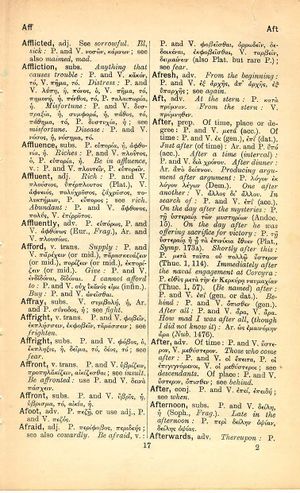after: Difference between revisions
(CSV3) |
m (Text replacement - "<b class="b2">Nub.</b>" to "''Nub.''") |
||
| Line 34: | Line 34: | ||
<b class="b2">After all</b>: P. and V. ἄρα, V. ἆρα. | <b class="b2">After all</b>: P. and V. ἄρα, V. ἆρα. | ||
<b class="b2">How mad I was after all</b>, (<b class="b2">though I did not know it</b>): Ar. ὡς ἐμαινόμην ἄρα ( | <b class="b2">How mad I was after all</b>, (<b class="b2">though I did not know it</b>): Ar. ὡς ἐμαινόμην ἄρα (''Nub.'' 1476). | ||
'''adv.''' | '''adv.''' | ||
Revision as of 16:54, 7 August 2017
English > Greek (Woodhouse)
prep.
Of time, place or
degree: P. and V. μετά (acc.).
Of time: P. and V. ἐκ (gen.), ἐπί (dat.).
Just after (of time): Ar. and P. ὑπό (acc.).
After a time (interval): P. and V. διὰ χρόνου.
After dinner: Ar. ἀπὸ δείπνου.
Producing argument after argument: P. λόγον ἐκ λόγου λέγων (Dem.).
One after another: V. ἄλλος διʼ ἄλλου.
In search of: P. and V. ἐπί (acc.).
On the day after the mysteries: P. τῇ ὑστεραίᾳ τῶν μυστηρίων (Andoc. 15).
On the day after he was offering sacrifice for victory: P. τῇ ὑστεραίᾳ ἢ ᾗ τὰ ἐπινίκια ἔθυεν (Plat., Symp. 173A).
Shortly after this: P. μετὰ ταῦτα οὐ πολλῷ ὕστερον (Thuc. 1, 114).
Immediately after the naval engagement at Corcyra: P. εὐθὺς μετὰ τὴν ἐν Κερκύρᾳ ναυμαχίαν (Thuc. 1, 57).
(Be named) after: P. and V. ἐπί (gen. or dat.).
Behind: P. and V. ὄπισθεν (gen.).
After all: P. and V. ἄρα, V. ἆρα.
How mad I was after all, (though I did not know it): Ar. ὡς ἐμαινόμην ἄρα (Nub. 1476).
adv.
Of time: P. and V. ὕστερον, V. μεθύστερον.
Those who come after: P. and V. οἱ ἔπειτα, P. οἱ ἐπιγιγνόμενοι, V. οἱ μεθύστεροι; see descendants.
Of place: P. and V. ὕστερον, ὄπισθεν; see behind.
conj.

